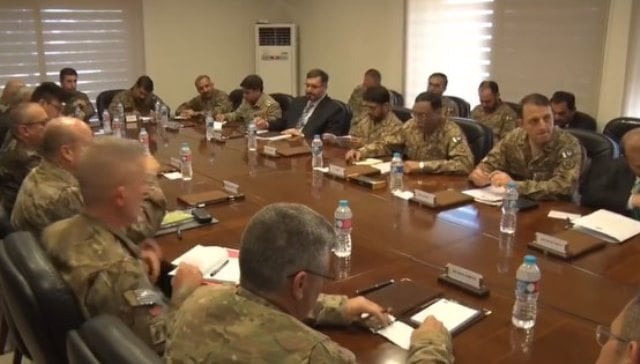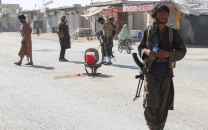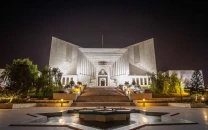Trilateral talks: Concerted efforts against Da’ish urged
Pakistan, Afghanistan and US discuss ways to prevent cross-border incidents

PHOTO: ISPR
The trilateral meeting also emphasised upon the need for coordinated efforts to eradicating threats posed by groups such as Da’ish.
The meeting, held at the General Headquarters (GHQ) in Rawalpindi in the backdrop of recent border clashes near Chaman, suggested that both neighbours were willing to sort out differences through talks.
According to a statement issued by the Inter-Services Public Relations (ISPR), the delegations were led by Afghanistan’s Director-General of Military Operations (DGMO) Major-General Habib Hesari and Resolute Support Mission’s Deputy Chief of Staff (Operations) Major-General Christopher Haas. Pakistan was represented by DGMO Major-General Sahir Shamshad Mirza.
“During the meeting, senior delegates stressed upon the need to defeat Da’ish through complementary efforts in respective areas of operations,” the ISPR statement said.
The resolve to eliminate threats posed by Da’ish came on the day the terrorist group claimed responsibility for an attack on the convoy of Senate’s Deputy Chairman Maulana Ghafoor Haideri.
The senior JUI-F leader survived the attack in Mastung, Balochistan, but at least 25 people lost their lives.
CPEC will offer militants additional targets: US
Meanwhile, the trilateral talks were succeeded by a meeting between the DGMOs of Pakistan and Afghanistan in which both sides discussed measures for improving military-to-military coordination and cooperation.
“The Chaman incident, border control / management and measures to curb cross-border fire violations were also discussed,” the ISPR stated.
Both sides agreed to increase the frequency of bilateral interactions at multiple tiers through different command and staff channels to foster an environment of mutual respect, trust, cordiality and cooperation.
The Chaman incident has undermined the process of rapprochement the two countries had recently initiated after months of strained ties.
Last week, Director General ISI Lt-Gen Naveed Mukhtar visited Kabul as part of efforts to reset ties with Afghanistan. His visit came on the heels of a trip by Chief of General Staff Lt-Gen Bilal Akbar to Afghanistan.
The flurry of exchanges was meant to defuse tensions and work out a mechanism to deal with the threat of militancy.
It is, however, not clear if the latest efforts will succeed as Afghan President Ashraf Ghani refused to travel to Islamabad unless an action by Pakistan against what he called the perpetrators of deadly terrorist attacks inside his country.
What has made the matter complicated is the friction triggered by Chaman border clashes.



















COMMENTS
Comments are moderated and generally will be posted if they are on-topic and not abusive.
For more information, please see our Comments FAQ